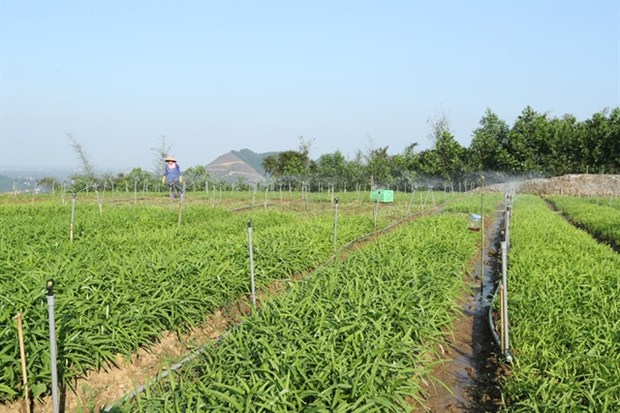Hanoi turns to green, effective agricultural production
Multiple areas in the capital city of Hanoi have been applying science and technology into agricultural production, shifting the sector towards organic to enhance food safety.
 Hoa Vien Farm in Yen Binh commune, Thach That district is known for its organic farming model and application of advanced technology. (Photo courtesy of Hanoi Agro-Forestry-Fisheries Quality Assurance Department)
Hoa Vien Farm in Yen Binh commune, Thach That district is known for its organic farming model and application of advanced technology. (Photo courtesy of Hanoi Agro-Forestry-Fisheries Quality Assurance Department)The COVID-19 pandemic and fuel price rises have led to the increased costs of fertilisers, pesticides, cultivars, and declining profits.
Responding to the challenges, the city has been developing green, environment-friendly agricultural models, aiming to increase efficiency by saving materials and recycling agricultural waste at the household level.
The model of cooperative is also becoming more popular.
According to Dong Thi Vinh, Director of Hong Ha Safe Vegetables Cooperative, the business has taken measures to produce clean produce and minimise the impact on the environment.
It has been requiring its members not to use chemical pesticides and apply technology into production and product processing.
On a daily average, the cooperative harvests 500kg of vegetables to deliver to supermarkets and convenience stores, equivalent to an earning of 4 million VND (171 USD).
Another organic agricultural cooperative named Nam Phuong Tien in Chuong My district has five hectares dedicated to organic farming, alongside 1,500ha for safe cultivation of Dien pomelo.
Vu Thi Huyen, the cooperative’s director, said that to generate a source of clean produce that responds to the market’s demands, the business only uses environment-friendly supplies in its production.
Safe produce can have up to 20 per cent higher value compared to products following traditional methods, she added.
Nguyen Thi Thu Hang, head of the Hanoi Agricultural, Forestry and Fisheries Quality Assurance Department, said the capital city currently has 5,044ha for growing safe vegetables and more than 50ha for organic farming, alongside various agricultural production models with advanced technology.
Ta Van Cuong, Deputy Director of the city's Department of Agriculture and Rural Development, said that growing green, safe, environment-friendly produce is a must in modern agriculture.
This will not only create favourable conditions for localities to form large-scale production areas and for quality control, but also bring in high economic value for farmers.
Hanoi has transformed more than 40,000ha from rice production to new agricultural models, of which 15,600ha are dedicated to high-quality rice, 3,000ha to safe vegetables, and 7,400ha for fruit trees.
Farmers are also able to produce their own organic fertiliser by combining agricultural byproducts and bioproducts.
This helps reduce some of the costs while maintaining the standards for clean production, increasing values and ensuring income for local people.
Tuong also said that to change the habit of using chemical fertilisers and pesticides, the department has held many training sessions on the nutrition needed in each stage of growth for optimal plant health.
Thanks to these measures, the amount of pesticides used by Hanoi farmers is among the lowest level, in comparison to other cities and provinces.
The city’s agricultural sector will continue to consult the local authorities on preferential policies in regard to credit, business locations, trade promotion, while also planning concentrated production areas and applying advanced technology.
Therefore, safe and effective production at a large scale is promoted to respond to the demands of the domestic market and for exports./.













